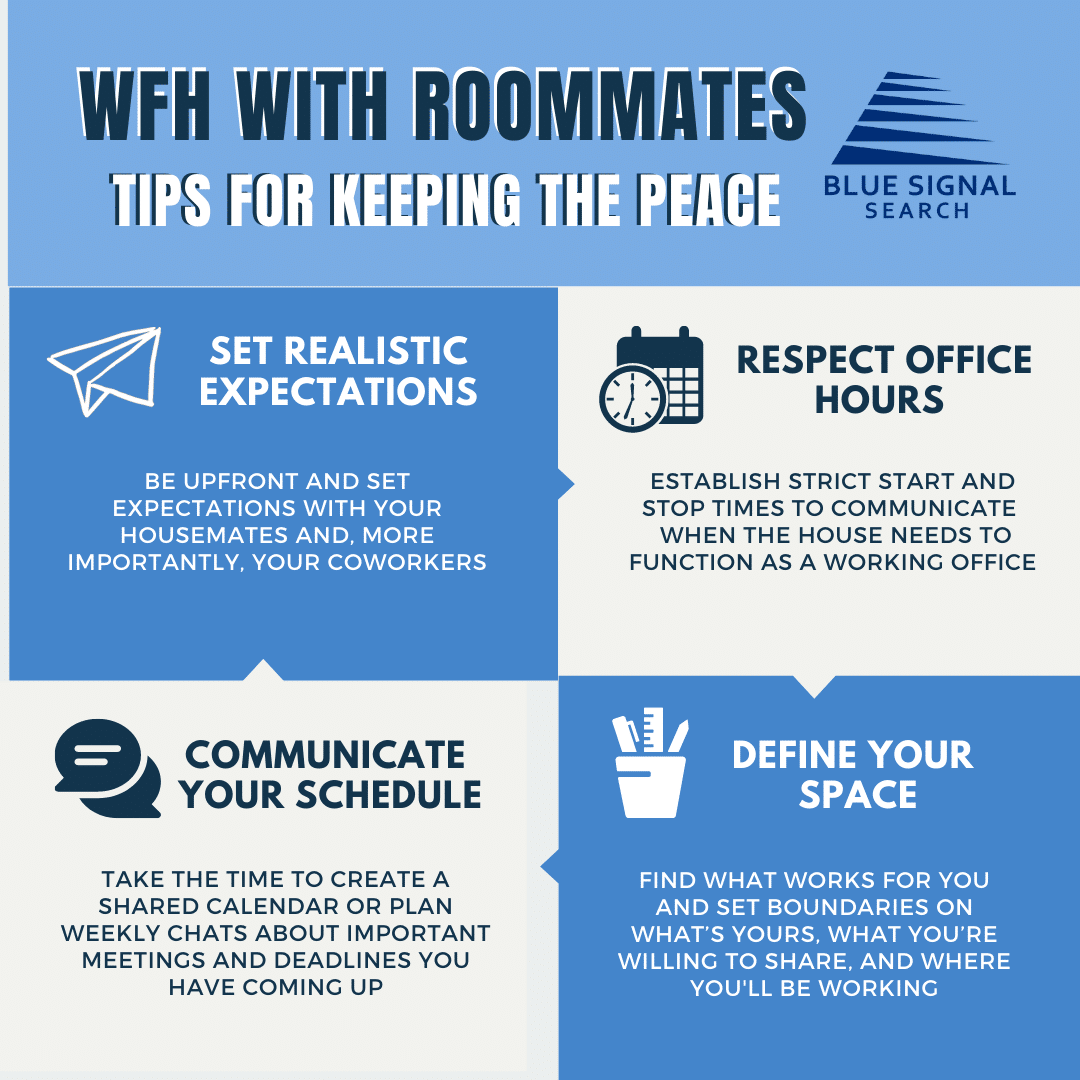For many companies that made the switch back in March, working from home is becoming the new normal with over half of Americans going remote. This change - which in the beginning seemed only temporary - is now a much more permanent solution for many businesses nationwide. Since these companies have already implemented so many new technologies and processes to collaborate as a team remotely, they’re realizing they can save money on office and real estate costs while still supporting a high-functioning staff. According to Global Workplace Analytics, employers can save up to $11,000 a year for each employee who works remotely even half the time.
Being able to work from home can be a great perk as far as cutting out your daily commute and knocking out chores around the house on your lunch break. On the other hand, it also means that your spouse, children, and roommates now become your new co-workers who can often be much more distracting. This can be difficult to navigate as you work out a plan and get used to spending a lot more time together. To help you find your new normal, here are some helpful tips and tricks to co-habitating and co-working with all members of your household.

Set Realistic Expectations
With such a big shift in your routine, there are bound to be some kinks that will take time to iron out, and that’s ok! Be upfront and set expectations with not only your housemates, but more importantly your coworkers. Everyone’s situation is anything but normal at the moment and there is no reason you should pretend it is. Whether you have kids being kids, or a roommate with a noisy call center job, it’s important to accept that things might not be 100% professional 100% of the time.
Start a conference call or zoom meeting by explaining your situation; “My kids are playing in the other room and might need my brief attention throughout the call” or “My husband’s on a call in the other room if you hear any background noise.” This sets the tone of understanding from the beginning so if anything does come up, everyone is prepared. Being open and honest about how you’re managing distractions can also be reassuring to your fellow coworkers who may be feeling overwhelmed, and show that they’re not in it alone.
Create Office Hours and Respect Them
Now that there’s no need to worry about commuting in morning traffic, you have the luxury to sleep in later and take your time getting to your desk. That being said, this can make it more difficult to get into a working state of mind and mentally ready for the day. A helpful tip is to wake up a little earlier and get something productive done before you even sit down at your desk. Something simple like unloading the dishwasher, journaling, or getting in a quick workout can wake you up and tell your brain you’re going to have a productive day.
When it comes to multiple people working different jobs under the same roof, getting on a similar schedule can help everyone stay productive and keep the peace. It’s important to set strict start/stop times and communicate those clearly to everyone. This helps to avoid any misunderstandings between significant others, kids, or roommates about when the house needs to function as a working office.
A good tip to communicate this to children is by using visuals to act as a constant reminder that you’re “on the clock”. Put up a gate or hang a sign on the door that requires them to stop and think if it's necessary to interrupt. This can actually be helpful for roommates too as no matter the age, sometimes people need a subtle reminder!
Communicate Your Schedule
Communicating not only your start/stop times but also specific events throughout your day can make the co-working process much more seamless. Take the time to create a shared calendar or plan weekly chats about important meetings, calls, deadlines, etc. you have coming up. Shared calendars are a great tool as you can color code events based on what you need from your roommates. Note events where it is crucial that the room be silent with no interruptions, and video meetings to ensure no one gets caught on camera unexpectedly. This way, each of you can plan your schedules accordingly.
For example, if you know your spouse has a video call late in the morning and needs a quiet room, you could maybe plan to take your lunch a little early that day to create a more relaxed environment. This is a great way to show you’re willing to be flexible and most likely they’ll return the favor for your next big meeting.
Define your Space
Small spaces can mean short tempers. We understand this is often unavoidable, but you can still find ways to define what’s yours and what you’re willing to share. Setting boundaries on things like office equipment may seem slightly petty at first, but when you’re scrambling to get a deadline turned in and your laptop charger is nowhere to be found, tension is bound to boil over. Clearly keep your things separated and in a safe place so you always know where to reach for them.
When it comes to finding your space, get creative while searching for quiet places to work and clear your head. Your car can act as another private room with a door that locks, for short term calls/meetings that you can’t be interrupted during. Taking a walk outside with fresh air can also be helpful when looking to relax or invigorate a new perspective on a project. It’s also a great way to take a call without others listening in from the next room.
When sharing communal spaces, make a plan about where you’re each going to work and when. Maybe one of you gets the living room/dining table to check emails while sipping coffee in peace in the morning and the other gets the space after lunch, or switch off days of the week. There is always some common ground to be found but it’s up to you and your housemates to communicate and work together to find it.
When it comes to working from home with kids, roommates or significant others, it’s important to accept that things aren’t going to be seamless and easy going from the start. Finding what will work for both of you is all about compromise and adjusting. If you decide on things to be one way and you find it’s not working, communicate and try something else! It’s going to take some time to settle into your new routines, but you will.
While navigating all aspects of your new normal, make sure to take the time to regularly check-in on your roommates and family as WFH can often cause some added stress. A simple check-in or a night set aside to enjoy each other and do something out of the ordinary is a great way to boost everyone's mood and create a better work/life balance within your home turned office.
Whether your situation is temporary or going to be a permanent schedule moving forward, being productive at home is achievable! Enjoy the added perks and give yourself and your housemates time to settle into these new roles.

